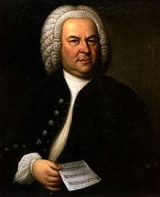Johann Sebastian Bach: An Ancient Role Model Speaks to our Future
Rick Marschall : Jun 13, 2011
ASSIST News
Bach has been called "The Fifth Evangelist."
(Swartz Creek, MI)–A towering creative figure born when the Age of Enlightenment had barely dawned, speaks to us today, casting dubiety on the egocentrism of contemporary theology.
In the time we have been doing these weekly messages, I occasionally have referred to the fact that I was in the process of writing a biography of Johann Sebastian Bach–the "Christian Encounters" of history's greatest music-maker. (Photo credit: Wikipedia)
 Several people have written, asking [about my book that] was published by Thomas Nelson Publishers. This week I will pass along a couple excerpts from the new book, Johann Sebastian Bach. I pray they have relevance to you in the week ahead. We can take away profound lessons from this man, who was an example of someone graced with talent, yet totally humble in desiring to turn these gifts back to God:
Several people have written, asking [about my book that] was published by Thomas Nelson Publishers. This week I will pass along a couple excerpts from the new book, Johann Sebastian Bach. I pray they have relevance to you in the week ahead. We can take away profound lessons from this man, who was an example of someone graced with talent, yet totally humble in desiring to turn these gifts back to God:
"Bach began virtually every composition, even his secular music, with a blank paper on which he wrote, Jesu, juva ("Jesus, help me") on the upper left corner of the first page, and Soli Deo Gloria ("To God alone the glory") on the bottom right corner of the finished ending. His was a personal relationship, not a professional duty, with the Savior.
Such "bookends" were as anointing oil over all of Bach's creative work. So did he begin and end his days–and his life–with such petition and praise: "Jesus, help me" and "To God alone be all the glory." With or without the mode of music, such dedication speaks to us through the years of Bach's relevance today.
Not every Believer has had a Road-To-Damascus moment like St Paul's, nor a terror-filled lightning storm in the Thuringian forest (where Luther vowed to study for the priesthood), nor directly contended with satan (as Luther, in the famous legend, threw an inkwell while translating the Bible in the Wartburg Castle, Eisenach).
Sebastian Bach modestly was born into the Lutheran faith, died a committed Lutheran communicant, and, by all evidence, never experienced any spiritual doubts or crises of faith. His employers were largely ecclesiastical, and his few "secular" (court music) postings always included Christian music in their assignments. Fully half of the music he wrote was Christian. He managed musical staffs at his churches, and he taught Christian education. He was not an ordained pastor, yet the degree of his daily study, and the examinations he was obliged to pass, proved him the peer of clergy. He was indeed one of the most equipped and effective "preachers" of his age. He has been called "The Fifth Evangelist."
Humble about his gifts, and determined that all his music was unto the Lord, we can see, as he surely did, that the Orchestral Suites and the Brandenburg Concertos and the Musical Offering and the Goldberg Variations and the suites for harpsichord and ‘cello and violin and flute?and the toccatas and trios and passacaglias and fantasias and fugues?were all spiritual compositions too. Just without words.?
Is this not the perfect blueprint for any Christian? Willing to forsake worldly acclaim, this modest servant of his Savior thanked God for the talents with which he was mightily blessed... and used them for the propagation of the Gospel, the souls of his fellow man, and the glory of God. The glory of God alone."
